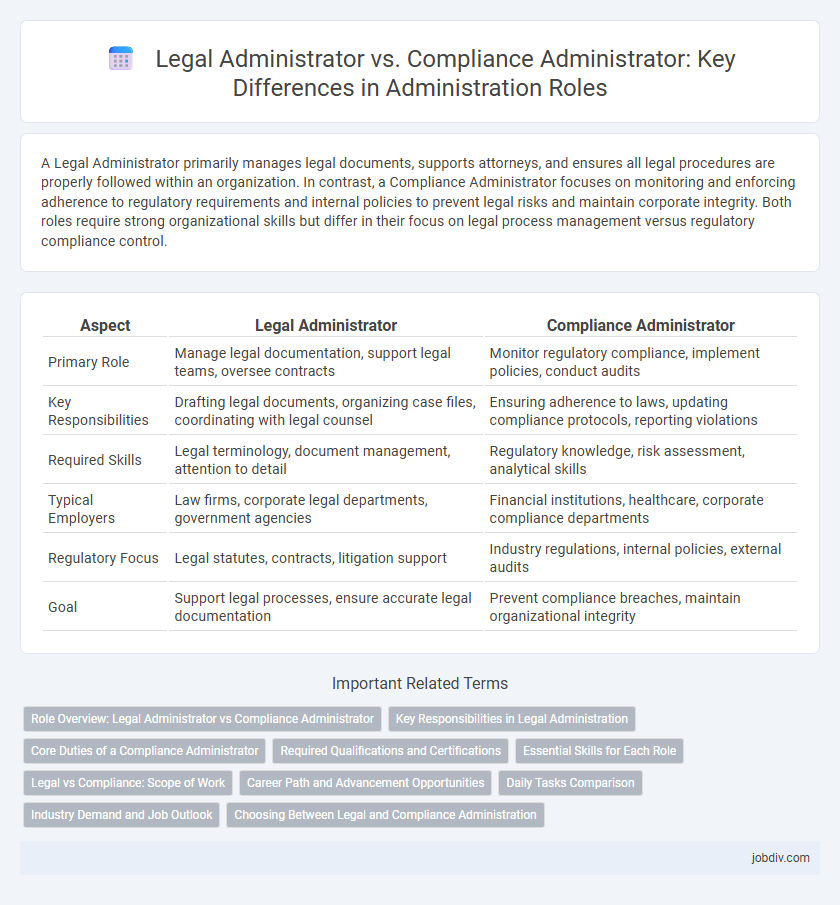A Legal Administrator primarily manages legal documents, supports attorneys, and ensures all legal procedures are properly followed within an organization. In contrast, a Compliance Administrator focuses on monitoring and enforcing adherence to regulatory requirements and internal policies to prevent legal risks and maintain corporate integrity. Both roles require strong organizational skills but differ in their focus on legal process management versus regulatory compliance control.
Table of Comparison
| Aspect | Legal Administrator | Compliance Administrator |
|---|---|---|
| Primary Role | Manage legal documentation, support legal teams, oversee contracts | Monitor regulatory compliance, implement policies, conduct audits |
| Key Responsibilities | Drafting legal documents, organizing case files, coordinating with legal counsel | Ensuring adherence to laws, updating compliance protocols, reporting violations |
| Required Skills | Legal terminology, document management, attention to detail | Regulatory knowledge, risk assessment, analytical skills |
| Typical Employers | Law firms, corporate legal departments, government agencies | Financial institutions, healthcare, corporate compliance departments |
| Regulatory Focus | Legal statutes, contracts, litigation support | Industry regulations, internal policies, external audits |
| Goal | Support legal processes, ensure accurate legal documentation | Prevent compliance breaches, maintain organizational integrity |
Role Overview: Legal Administrator vs Compliance Administrator
A Legal Administrator manages contractual documentation, legal correspondence, and supports law teams by ensuring accurate case file maintenance and regulatory filings. In contrast, a Compliance Administrator monitors adherence to company policies, regulatory standards, and industry-specific laws, conducting audits and training to mitigate risks. Both roles require meticulous documentation skills, but Legal Administrators focus on legal procedures while Compliance Administrators emphasize regulatory compliance.
Key Responsibilities in Legal Administration
Legal Administrators oversee contract management, litigation support, and corporate governance to ensure lawful business operations and risk mitigation. Their responsibilities include drafting and reviewing legal documents, coordinating with external counsel, and maintaining regulatory compliance records. This role demands a comprehensive understanding of legal frameworks to support organizational decision-making and policy enforcement effectively.
Core Duties of a Compliance Administrator
A Compliance Administrator ensures organizational adherence to regulatory requirements by developing, implementing, and monitoring internal policies and procedures. They conduct regular audits, manage risk assessments, and provide training to employees to maintain legal and ethical standards. Their core duties prioritize minimizing compliance risks and safeguarding the company from legal penalties and reputational damage.
Required Qualifications and Certifications
Legal Administrators typically require a bachelor's degree in legal studies, business administration, or a related field, along with certifications such as Certified Paralegal (CP) or Legal Management Certificate to demonstrate expertise in legal documentation and processes. Compliance Administrators often need a background in law, finance, or business, supplemented by certifications like Certified Compliance & Ethics Professional (CCEP) or Regulatory Compliance Certification (RCC) to ensure adherence to industry regulations and standards. Both roles demand strong organizational skills but differ significantly in their specialized qualifications tailored to legal governance versus regulatory compliance management.
Essential Skills for Each Role
Legal Administrators require strong knowledge of legal terminology, contract management, and regulatory requirements to support law firms or corporate legal departments effectively. Compliance Administrators must possess expertise in risk assessment, policy implementation, and monitoring regulatory adherence to ensure organizational conformity with laws and standards. Both roles demand exceptional organizational skills, attention to detail, and proficiency in legal and compliance software.
Legal vs Compliance: Scope of Work
Legal Administrators manage contracts, litigation support, and regulatory filings, ensuring organizational adherence to legal requirements and minimizing legal risks. Compliance Administrators focus on developing, implementing, and monitoring internal policies to guarantee conformity with industry regulations and standards. While Legal Administrators handle legal documentation and court-related processes, Compliance Administrators proactively oversee ethical practices and regulatory adherence across business operations.
Career Path and Advancement Opportunities
Legal Administrators typically progress within law firms or corporate legal departments, advancing to roles such as Legal Operations Manager or Director of Legal Services by leveraging expertise in legal processes and regulations. Compliance Administrators often move into specialized compliance roles or become Compliance Managers, focusing on regulatory adherence in industries like finance, healthcare, or manufacturing. Career advancement for both positions depends on gaining industry-specific knowledge, certifications like Certified Compliance & Ethics Professional (CCEP) or Paralegal certifications, and developing strong organizational and analytical skills.
Daily Tasks Comparison
Legal Administrators primarily handle contract management, legal document preparation, and coordination with external counsel, ensuring all legal paperwork complies with regulatory standards. Compliance Administrators focus on monitoring internal policies, conducting audits, and managing risk assessments to maintain adherence to industry regulations. While both roles require detailed record-keeping and reporting, Legal Administrators prioritize legal obligations, whereas Compliance Administrators emphasize regulatory compliance and operational oversight.
Industry Demand and Job Outlook
Legal Administrators and Compliance Administrators both face growing industry demand due to increasing regulatory complexities across sectors such as finance, healthcare, and technology. The job outlook for Legal Administrators is strong, driven by the need for managing legal documentation and supporting litigation processes, while Compliance Administrators see rapid growth fueled by heightened corporate governance and risk management requirements. Employment projections indicate a 10-15% increase over the next decade for both roles, reflecting the critical importance of legal and regulatory adherence in modern business operations.
Choosing Between Legal and Compliance Administration
Choosing between a Legal Administrator and a Compliance Administrator depends on the organization's primary needs; Legal Administrators manage contracts, legal documentation, and liaise with legal teams, ensuring regulatory adherence through direct legal oversight. Compliance Administrators focus on implementing, monitoring, and enforcing internal policies to meet industry standards and regulatory guidelines, specifically targeting operational compliance and risk mitigation. Organizations prioritizing legal risk management and litigation support often prefer Legal Administrators, whereas those emphasizing ongoing regulatory adherence and audit readiness typically select Compliance Administrators.
Legal Administrator vs Compliance Administrator Infographic

 jobdiv.com
jobdiv.com